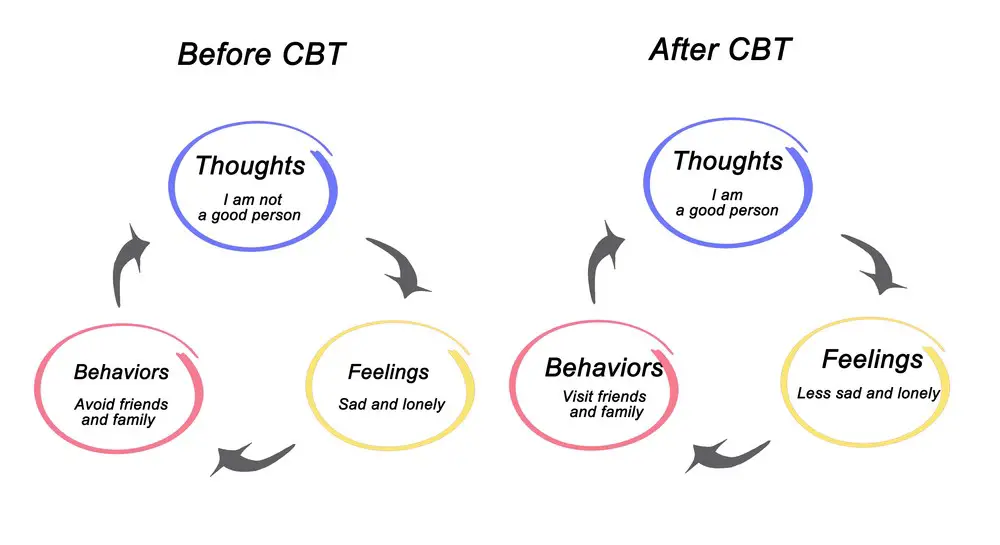As a BetterHelp affiliate, we receive compensation from BetterHelp if you purchase products or services through the links provided
Embarking on a therapeutic journey can be both an exciting and challenging experience. As you start considering therapy, it’s essential to reflect on the reasons why you’re seeking professional help and what you’d like to achieve during this process. For many individuals, therapy offers a safe space to work through personal problems, gain new perspectives, and learn practical coping skills to navigate life’s challenges more effectively.
Finding the right therapist is a crucial step in obtaining the desired outcome. The therapeutic process is greatly influenced by the relationship quality between you and your therapist, so it’s worth taking the time to find someone with whom you feel comfortable and supported. Once you’ve entered therapy, it’s important to set clear goals and be honest with yourself and your therapist about the issues you want to address.
Understanding the purpose of therapy is essential in managing your expectations and ensuring you get the most out of your sessions. Be open to exploring different types of therapies that may better suit your needs and consider how your therapist’s guidance and expertise can help you develop healthier coping mechanisms and achieve emotional growth.
Key Takeaways
- Reflect on your reasons for seeking therapy and establish clear goals.
- Finding the right therapist is essential for a successful therapeutic experience.
- Be open to exploring various therapy types and techniques for personal growth.

Finding the Right Therapist
Finding the right therapist is essential for getting the most out of your therapy experience. Just like you wouldn’t settle for any doctor, you need to invest time in identifying the best fit for your needs. Here’s how you can go about it:
Consider your specific needs: Look for therapists who specialize in the areas you need help with, such as anxiety, depression, or relationship issues. If you’re part of the LGBTQ community or seeking therapy for black girls, search for a therapist with experience working with those demographics.
Check credentials: Ensure potential therapists have the necessary qualifications and licenses in their field. Some credentials to look for include Licensed Clinical Social Worker (LCSW), Licensed Professional Counselor (LPC), and Licensed Marriage and Family Therapist (LMFT).
Use an online database: Platforms like the Psychology Today Therapy Directory are excellent resources for finding local therapists, with filters according to specialties, location, and more. Online directories also provide information on each therapist’s approach, credentials, and fees.
Explore teletherapy: If you’re open to remote therapy sessions, you can widen your search to include therapists who offer teletherapy services, expanding your options for finding a perfect fit.
To make your therapy journey worthwhile, remember these pointers:
- Reflect on your needs and preferences to narrow down your search for a therapist
- Verify their credentials and area of expertise
- Utilize online databases like the Psychology Today Therapy Directory
- Consider teletherapy as an alternative to in-person sessions
By following these steps, you’ll be well on your way to finding a therapist who can support and guide you through your mental health journey.

Understanding the Purpose of Therapy
Therapy is an investment in your mental health and well-being. Understanding what you want to get out of therapy is essential to make the most of your time and effort. The primary goal of therapy is to help you navigate through challenging emotions, thoughts, and behaviors and improve your overall mental health.
One of the key purposes of therapy is to identify and address your specific needs. These may include managing stress, improving relationships, or overcoming anxiety and depression. In therapy, you and your therapist will work together to gain insights into your patterns and develop healthier, more effective habits.
Psychotherapy comes in different forms, such as cognitive-behavioral, interpersonal, and psychodynamic approaches. Each approach has its own set of techniques and strategies to help you reach your mental health goals. By understanding these approaches, you can better grasp the purpose of therapy and make informed decisions about the type of therapy that is right for you.
Another vital aspect of therapy is the collaboration between you and your therapist. A strong therapeutic relationship is crucial to the success of your treatment. A trusting and open connection will allow you to explore your thoughts and emotions safely and help your therapist tailor therapy to your unique needs and goals.
To make the most of your therapy experience, consider the following:
- Set clear and realistic goals: Identify what you want to achieve in therapy and ensure these objectives are specific, measurable, achievable, relevant, and time-bound (SMART).
- Be patient and persistent: Change takes time, and progress in therapy may be gradual. Stay committed, and remember that therapy is a long-term investment in your mental health.
- Open-mindedness and honesty: Be willing to explore new perspectives and be honest with yourself and your therapist about your feelings, thoughts, and concerns.
- Actively participate: Engage in therapy sessions, ask questions, and complete assignments or tasks your therapist suggests to progress toward your goals.
- Reflect and evaluate: Regularly assess your progress and discuss any concerns or adjustments needed with your therapist to ensure you are on the right track.
By understanding the purpose of therapy and putting in the effort to reach your mental health goals, you’ll be well on your way to a happier and healthier life. Remember, therapy is a deeply personal journey; your experience will be unique. Embrace the process and allow yourself the opportunity to grow and heal.

Establishing Therapy Goals
Before diving into therapy, it’s crucial to establish your therapy goals. This will provide a clear direction and help you make the most out of your sessions. Here are some suggestions to assist you in setting your therapy goals:
1. Reflect on your motives and desires
Begin by considering your broad motives, hopes, and dreams. This could be anything from wanting to feel happier, overcoming anxiety, or enhancing relationships. These general goals will serve as the basis for more specific objectives and plans during therapy.
2. Identify specific objectives
Beneath your broad goals, pinpoint specific objectives that you want to achieve. For example, to improve your relationships, you might aim to strengthen your communication skills or learn conflict resolution techniques. Be as precise as possible in identifying these objectives.
3. Create a plan
Work with your therapist to develop a structured plan to achieve your goals. Your plan should include tangible steps and milestones that can be monitored and adjusted over time. This will give you a sense of progress and help keep you on track during your therapy journey.
4. Monitor your progress
Throughout your therapy sessions, consistently review and evaluate your progress toward your goals. Discuss achievements and areas that may need more attention or adjustments with your therapist. Keeping track of your progress enables you to see tangible results and fosters motivation to continue working toward your goals.
5. Be open to adjustments
As you progress through therapy, your goals might change or evolve. It’s important to remain open and flexible, allowing yourself to reevaluate and adjust your goals as needed. Your therapist can provide guidance based on your growth and development, ensuring that your goals remain realistic and achievable.
In summary, establishing therapy goals involves reflecting on your desires, setting specific objectives, developing a plan, monitoring progress, and staying flexible to change. Doing so will create a solid foundation for your therapy journey and increase the likelihood of achieving the desired outcomes.

Exploring Types of Therapy
When considering therapy, it’s essential to explore different types to find the one that suits your needs best. Therapy is not a one-size-fits-all solution; what works for someone else may not necessarily work for you. Let’s dive into a couple of popular types of therapy you might encounter on your journey to self-improvement.
Cognitive Behavioral Therapy (CBT) is a widely used approach to help people identify and change negative thought patterns, attitudes, and behaviors. It focuses on providing practical strategies to tackle life problems. Some key benefits of CBT include:
- Learning to recognize and challenge irrational thoughts
- Developing healthier ways to respond to difficult situations
- Gaining a sense of control over emotions and reactions
In addition to CBT, there are other types of therapy you might consider, such as:
- Psychodynamic therapy focuses on uncovering and understanding the impact of past experiences and emotions on current behavior.
- Humanistic therapy emphasizes personal growth, self-awareness, and self-acceptance, allowing you to reach your potential.
- Family therapy addresses issues within the family unit, enhancing communication and promoting healthier relationships.
When exploring these options, assess which approach aligns best with your therapy goals. Consider the issues you must address and the type of therapist or therapy style that resonates with you. Being open to various therapy types can significantly impact your overall experience and the outcomes you achieve.

Key takeaway: Experiment with different types of therapy until you find the most effective for your needs. Cognitive Behavioral Therapy (CBT) is a popular and effective option, but don’t forget to explore other approaches such as psychodynamic, humanistic, and family therapy. Your journey to self-improvement will be more successful when you choose a therapy type tailored to your goals.
Interacting with Therapists
Developing a comfortable and trusting relationship with your therapist is essential for successful therapy sessions. A strong therapeutic relationship can be achieved through effective communication and collaboration. Here are some tips to help you interact with your therapist and enhance the overall experience:
- Be open and honest: Share your thoughts, feelings, and experiences without holding back. Your therapist is a professional who is there to listen and provide guidance, so it’s important to be as truthful as possible.
- Establish clear goals: Clearly define your therapy objectives early in the sessions. Having shared goals will ensure you and your therapist work together towards a common objective.
- Ask questions: Don’t hesitate to ask your therapist questions about their approach, techniques, or anything unclear. This will help you better understand the therapy process and foster open communication.
- Listen actively: Though sharing your feelings is crucial, listening to your therapist’s advice and perspectives is equally important. Engaging in the conversation and being receptive to feedback can enhance your therapeutic experience.
- Be collaborative: Work with your therapist to achieve the best results. Actively participate in the process, be open to suggestions, and contribute to discussions about your progress.
- Build trust: Trust is the foundation of a successful therapeutic relationship. It may take time to develop, but being open, respectful, and consistent in your sessions will help build trust with your therapist.
Remember, a comfortable and trusting environment will enable you to make the most out of your therapy sessions. By focusing on effective communication and collaboration with your therapist, you’ll be well on your way to achieving your goals and experiencing personal growth.

Navigating Therapy Sessions
Therapy sessions require an open mindset and a willingness to explore your emotions, thoughts, and behaviors. As you navigate your therapy sessions, being honest with yourself and your therapist is essential. Share your feelings, thoughts, and emotions openly, creating a strong foundation for your therapeutic relationship.
During your sessions, be open to discussing your struggles and progress. Actively participate in the conversation, providing feedback on your feelings and emotions. Your therapist is there to help and guide you, but it’s important to remember that you have control over the direction of the session:
- Discuss your thoughts: Sharing your thought processes, triumphs, and challenges will give your therapist valuable information and insights about your journey.
- Express your emotions: Delving into the emotions accompanying your experiences is crucial to therapy. Don’t be afraid to show vulnerability; genuine emotional expression shows growth and healing.
- Ask questions: Remember, your therapy sessions are also a space for learning. Inquire about different techniques, strategies, or behaviors that could help improve your mental health.
Maintaining an open line of communication with your therapist is essential, as your openness and honesty will enhance the overall effectiveness of your therapy sessions. Be willing to provide feedback on your therapist’s approach, and don’t hesitate to ask for clarification on any points that might be unclear.
Incorporate the skills and strategies learned in your sessions into your everyday life. Applying these techniques will help deepen your understanding and promote lasting change. Keep track of the differences you notice in your emotions, thoughts, and behaviors as you implement these new tools.
Lastly, be patient with yourself. Change takes time and effort, but by engaging actively in your therapy sessions and persisting in your commitment to self-improvement, you’ll be well on your way to achieving your therapeutic goals.
Addressing Specific Issues
When you start therapy, one of the main goals may be to address specific issues you’re facing. These issues could include depression, anxiety, trauma, or any other personal challenges that are causing you distress.
Acknowledging these issues, setting clear and attainable goals with your therapist, and learning strategies to overcome them will be crucial in your therapy journey. This section will cover how therapy can help you address common issues like depression, anxiety, and trauma.
Depression: Dealing with depression in therapy involves understanding the cause, managing your symptoms, and developing new coping skills. Your therapist may use cognitive-behavioral therapy (CBT) or interpersonal therapy (IPT) to help you navigate and alleviate your depression.
Anxiety: Therapy can help you understand the triggers of your anxiety and teach you tools to manage it effectively. Techniques such as exposure therapy, CBT, or dialectical behavior therapy (DBT) can be helpful, depending on the type and severity of your anxiety.
Trauma: Addressing past traumas in therapy can be essential to healing and regaining a sense of safety. Your therapist may utilize evidence-based approaches like trauma-focused CBT, eye movement desensitization and reprocessing (EMDR), or prolonged exposure therapy (PE) to help you process your traumas and build resilience.
Remember, therapy is a collaborative process, and you must actively participate in setting goals and identifying strategies based on your specific issues. Be open and honest with your therapist about your concerns and needs for both of you to work together towards your improvement. This way, you can achieve tangible results and get the most out of therapy.

Learning Coping and Problem-Solving Skills
Developing effective coping and problem-solving skills can greatly enhance your experience in therapy. Learning to manage your emotions and face challenges more effectively will improve your overall mental health and well-being.
Coping skills generally fall into two categories: emotion-focused coping and problem-focused coping. Emotion-focused coping strategies aim to manage your emotional responses to stressors, while problem-focused coping strategies involve directly addressing the source of stress. Some effective emotion-focused coping strategies include:
- Practicing mindfulness meditation
- Using relaxation techniques such as deep breathing or progressive muscle relaxation
- Engaging in activities that bring you joy, such as hobbies or exercise
- Seeking support from friends or loved ones
On the other hand, problem-focused coping strategies might involve:
- Identifying the cause of your stress and brainstorming solutions
- Breaking larger problems into smaller, more manageable tasks
- Implementing time management techniques to reduce stress related to deadlines
- Evaluating your priorities and making necessary adjustments
Therapy can assist you in developing these skills through various evidence-based approaches, such as cognitive-behavioral therapy (CBT). CBT is widely used for treating anxiety disorders, among other conditions, and is known for its effectiveness in addressing negative thought patterns and promoting adaptive coping skills.
During your therapy sessions, you may work together with your therapist to:
- Identify and challenge unhelpful thoughts and beliefs
- Create personalized coping strategies suited to your specific needs
- Implement problem-solving techniques to navigate daily challenges
- Strengthen your support network and foster emotionally supportive relationships
Remember, everyone’s coping skills and style are different. Experimenting with various strategies to find what works best for you is essential. As you continue to engage in therapy and develop these skills, you’ll become better equipped to handle life’s challenges and maintain your mental well-being.
Key takeaway: Learning coping and problem-solving skills in therapy can greatly benefit your overall mental health, leading to enhanced emotional resilience and better management of stressors in your everyday life.
The Role of Homework in Therapy
When you engage in therapy, homework assignments can be crucial to your progress. These tasks, assigned between sessions, help you practice and apply new skills and insights learned in therapy.
Therapy homework can take various forms, such as:
- Symptom logs
- Self-reflective journals
- Specific tools for managing thoughts and behaviors
One of the main benefits of homework is that it keeps you actively engaged with the therapeutic process outside of sessions. By setting aside a designated time for your homework, you invest in yourself and work on your goals. This dedicated time serves as a sacred space for personal growth and self-reflection.
Another advantage of homework assignments is that they make tracking progress easier for you and your therapist. As you complete tasks and document your experiences, you’ll better understand your improvements and the areas that still need work.
To optimize your therapy homework experience, consider implementing these tips:
- Schedule a consistent time for your homework, ensuring it’s a non-negotiable part of your routine.
- Review your work with your therapist, discussing any challenges or insights.
- Embrace the process, recognizing that even small steps can lead to meaningful progress.
Remember that the role of homework in therapy is to help you bridge the gap between sessions, keeping you focused on your goals and allowing for continuous growth. You can make the most of your therapeutic journey by taking these assignments seriously and reflecting on your progress.
Insurance and Payments for Therapy
Navigating the world of insurance and payments for therapy can be tricky, but understanding your options will help you make the best decision for your mental health. Here are a few key points to consider:
Insurance coverage: First, determine if your insurance covers therapy sessions. Review your policy details, contact your insurance provider, or speak with a potential therapist about their experience with your insurer. Remember that not all insurance plans cover every type of therapy, so you may need to research to find a therapist who specializes in the treatment you seek.
In-network vs. out-of-network therapists: When searching for a therapist, look for one in-network with your insurance provider. This means the therapist has a contract with your insurer and has agreed to their reimbursement rates. This will typically be the most affordable option for you, as your insurance will cover a portion of the cost, and you’ll be responsible for the remaining co-pay. Out-of-network therapists may not have a contract with your insurer, which can result in higher costs.
Sliding scale fees: If insurance isn’t an option or you’re concerned about the cost, many therapists offer sliding scale fees. The therapist adjusts their rate based on your income or financial situation. Don’t hesitate to ask a potential therapist if they offer this option.
Health savings accounts (HSAs): If you have a health savings account (HSA), you can use the funds to pay for therapy sessions. This can be a tax-efficient way to cover the cost of your mental health care.
Payment strategies: To ensure prompt payment and avoid confusion, discuss insurance policies and payment options with your therapist upfront. Before beginning therapy, verify your insurance coverage, reimbursement rates, and any applicable co-pays or deductibles.
Remember, investing in your mental health is essential, and understanding your options regarding insurance and therapy payments will help you make the best choice.
Understanding Confidentiality in Therapy
When you begin therapy, it’s essential to know that confidentiality is a crucial aspect of the therapeutic process. Confidentiality means that the information you share with your therapist is protected and not disclosed to anyone without your consent, creating a safe space for open and honest communication.
Therapists take your privacy very seriously. They are bound by ethical and legal guidelines to maintain confidentiality, ensuring that you can feel secure discussing sensitive topics. However, keep in mind that there are some limits to confidentiality:
- If a therapist believes you are in imminent danger of harming yourself or others, they may need to take action to protect you or the person at risk
- If a therapist suspects child abuse, elder abuse, or dependent adult abuse, they are legally required to report this to the appropriate authorities
- In some circumstances, a court order may require your therapist to disclose information
To navigate these limits, it’s crucial to have open communication with your therapist about confidentiality from the start. They can explain the circumstances under which they might need to break confidentiality and discuss any concerns you may have. Take note of the following strategies to help you understand confidentiality in therapy:
- Ask your therapist about their confidentiality policies and any scenarios where they would need to disclose information
- Inquire about the methods they use to safeguard your information, both electronically and physically
- If you’re unsure about what you can or cannot disclose in therapy, ask your therapist for clarification
By having a solid grasp of confidentiality, you can feel more at ease entering therapy and fully benefit from your sessions. Key takeaway: Understanding confidentiality in therapy is vital for feeling secure and maximizing the benefits of your therapeutic journey. Make sure to have open communication with your therapist about their confidentiality policies and practices.
The Impact of Therapy
Therapy can be a life-changing experience, as it offers you the opportunity to work on personal growth, enhance your relationships, and gain a better understanding of yourself. In this section, we’ll explore the various ways therapy can impact your life and help you achieve your goals.
Firstly, therapy can lead to significant personal growth. By participating in therapy, you will have the opportunity to confront and better understand the thoughts, behaviors, or past experiences that may be holding you back from contentment. Working with a therapist can help you develop strategies and coping mechanisms, allowing you to make meaningful changes and become the best version of yourself.
Another important aspect of therapy is the potential for improving relationships. Many people find that therapy helps them to develop better communication skills, empathy, and emotional intelligence. These skills can be applied to various aspects of your personal and professional life, leading to stronger and more fulfilling relationships with those around you.
Furthermore, therapy often promotes self-awareness and self-reflection. As you work with a therapist, you’ll have the opportunity to delve into your own thoughts, emotions, and experiences. This can help you identify patterns and behaviors that may be hindering your happiness or success, allowing you to work towards positive change.
While therapy often involves discussing difficult topics and may feel uncomfortable at times, it’s important to remember that growth often happens when we step outside of our comfort zones. As you progress through therapy, be prepared to face challenges head-on and embrace the opportunity for personal development.
To summarize, therapy can have a profound impact on various aspects of your life—including personal growth, relationships, and self-awareness. By engaging in therapy, you are taking a crucial step towards better understanding yourself and improving your overall well-being.
Continued Self-Care and Therapy Practice Post Sessions
It’s essential to focus on self-care after your therapy sessions to help you process the emotions and lessons you’ve encountered. This practice will enable you to better understand your therapy experiences, allowing you to make the most out of your sessions. Here are a few tips to help you maintain a healthy balance between self-care and therapy practice.
First, give yourself time to reflect on the session and digest the insights you’ve gained. It’s a good idea to set aside some time after your therapy appointment and engage in an activity that allows you to process your thoughts and emotions. This can range from taking a walk, journaling, or simply relaxing in a quiet space.
Another helpful tip is to schedule your therapy sessions at a time when you can have some downtime afterward. This way, you won’t feel rushed to jump back into your daily routine without proper self-care. Scheduling sessions during the weekend or evening hours can provide you with the flexibility and time needed for this valuable self-care.
Incorporating regular self-care activities into your daily life can improve your overall well-being and encourage therapeutic progress. Some self-care ideas may include:
- Engaging in physical activities, such as exercise or yoga
- Prioritizing sleep and rest
- Nurturing social connections with friends and family members
- Participating in hobbies and interests that bring joy and relaxation
As you go through your therapy journey, be open to modifying your self-care practices based on your progress and needs. Your therapist can work with you to identify the best self-care approaches that align with your values and supportive strategies for navigating everyday stressors.
In summary, focusing on continued self-care and therapy practice between sessions plays a crucial role in processing your therapy experiences and maximizing the benefits. Don’t hesitate to explore and experiment with self-care activities that suit your needs best, maintaining a strong foundation for personal growth and fulfillment.
Frequently Asked Questions
What are common short-term goals in therapy?
Short-term goals in therapy often focus on managing day-to-day stressors and difficulties. These may include:
- Reducing anxiety or depressive symptoms
- Enhancing communication skills
- Developing coping strategies
- Increasing self-awareness
- Identifying triggers for negative emotions
Remember, everyone’s path in therapy is unique, so your short-term goals will be tailored to your specific needs.
How can I set personal goals for therapy?
Setting personal goals for therapy involves reflecting on your current struggles and what you hope to achieve. Consider the following steps:
- Identify your main concerns or issues
- Clarify what aspects of your life you’d like to improve
- Break down broad goals into smaller, achievable steps
- Discuss your goals with your therapist
- Regularly review and adjust your goals as needed
Having clear goals helps you and your therapist work together effectively towards your desired outcomes.
What are some examples of SMART goals for therapy?
SMART goals are Specific, Measurable, Achievable, Relevant, and Time-bound. Some examples for therapy include:
- Reducing panic attacks from once a week to once a month within three months
- Developing a self-care routine by incorporating two new activities within six weeks
- Practicing effective communication techniques with your partner for one month
Creating SMART goals facilitates progress tracking and promotes a sense of accomplishment throughout your therapeutic journey.
What can I expect to gain from therapy sessions?
Therapy sessions offer various benefits, such as:
- Insight into your thoughts, feelings, and behaviors
- Increased self-esteem and self-acceptance
- Improved relationships
- Enhanced problem-solving and decision-making skills
- A toolbox of coping strategies to navigate life’s challenges
Keep in mind that everyone’s experience in therapy is different, and the benefits may vary depending on your unique situation and goals.
What are typical long-term therapy goals?
Long-term therapy goals involve significant personal growth and addressing underlying patterns. These may include:
- Overcoming past traumas
- Developing a more secure attachment style
- Establishing healthier boundary setting in relationships
- Cultivating a strong sense of identity and purpose
- Resolving deep-rooted emotional or psychological issues
Long-term goals often require ongoing commitment and effort but can lead to profound, lasting change.
How can I prepare for therapy sessions?
To get the most out of therapy sessions, consider the following tips:
- Reflect on your feelings, thoughts, and experiences since your last session
- Make a list of topics or questions you’d like to discuss
- Set aside time to clear your mind and get focused before your appointment
- Be open, honest, and willing to engage with your therapist during sessions
By being proactive and prepared, you can optimize your time in therapy and facilitate meaningful progress.
About Jacob Maslow
After surviving the traumatizing events of 9/11, I took it upon myself to heal through helping others. I’m the primary caregiver of my children and understand from first-hand experience the lonely paths you have to walk as a partner and parent when leaving an unhealthy relationship.
We’re all echoing in a dark space that doesn’t have to be this empty, and that’s been my mission since finding solace and recovery in therapy: To help comfort others who are still in shock and at the prime of their struggle.
I came across BetterHelp after searching for this type of community. I wanted to belong to a body of proactive therapists and supportive therapy veterans that allowed me to see other sides of the story.
It was unconventional, and that’s what attracted me most. During my most challenging times, when my ex-wife completely cut me off from my children, I found comfort and clarity through BetterHelp.
Instead of being chained to a strict therapist recommendation, I was in charge of who I felt understood my struggle most. That allowed me to find my true peace, as I was reunited with those who read behind my words and had first-hand experience with my trauma.
Recovery is a choice; with BetterHelp, that choice will be a few clicks away. You can join their couples-oriented platform, Regain.us, for those stuck with family estrangement and toxic relationship patterns.
- 3 Ways Wearing a Hat Can Help Lower Your Stress Levels - April 19, 2025
- Breaking the Silence: Why Men’s Mental Health Matters More Than Ever - April 15, 2025
- How to Transform a Home’s Patio Space into a Relaxing Space - March 23, 2025
This site contains affiliate links to products. We will receive a commission for purchases made through these links.



